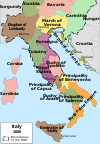Teia
Teia (died 552 or 553), also known as Teja, Theia, Thila, Thela, Teias, was the last Ostrogothic king in Italy.
Apparently a military officer serving under Totila, Teia was chosen as his successor and raised over a shield after Totila was killed in the Battle of Taginae (also known as the Battle of Busta Gallorum) in July 552. On his way fleeing to southern Italy, he gathered support from prominent figures within Totila's armies, including Scipuar, Gundulf (Indulf), Gibal and Ragnaris, to make his last stand against the Byzantine eunuch general Narses at the Battle of Mons Lactarius, south of present-day Naples, near Nuceria Alfaterna, in October 552 or early 553. The Ostrogothic army was defeated once again. Teia was killed and his brother Aligern surrendered. Scipuar and Gibal were probably also killed. Gundulf and Ragnaris escaped from the field; the latter was later mortally wounded after a failed assassination by an agent of Narses.
With that defeat, organized Ostrogothic resistance ended. Although the last attested Gothic noble Widin revolted in northern Italy in 550s and was captured in 561 or 562, the Ostrogoths faded into obscurity.
Sources
- Norwich, John Julius. Bisanzio - Splendore e decadenza di un Impero. pp. 91–92.

